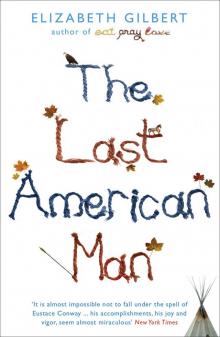- Home
- Elizabeth Gilbert
The Best American Travel Writing 2013 Page 7
The Best American Travel Writing 2013 Read online
Page 7
A few paces short of the padlocked door, darkness falls. Fumbling through all eight pockets of my safari suit, I chide myself for forgetting that there is no dusk on the equator—no grace period with kindly librarians announcing, “We will close in fifteen minutes,” while you gather up your scattered papers. Here the lights get cut off without warning, and you’d better know where you put your flashlight and your key.
Once inside, I flick around the weak beam of my flashlight to reveal a woodstove, a rough-hewn table, cabinets, six drawers. I set about ransacking the drawers for a candle.
There’s a knock at the door, and I hope it will be the caretaker, come to help me find things. Instead, it’s an old peddler. Eyeing me from beneath the visor of his baseball cap, he holds out a peculiar object: a yard-long stick with a sharp-edged stone disk fastened to one end. When I ask what it is, he says in Pidgin, “An instrument for killing people.” I tell him I don’t think I’ll be needing one.
The weapon doesn’t surprise me. Until their conversion to Christianity about 10 years ago, some of the peoples of Sandaun practiced warfare and some were cannibals, so it stands to reason that they might have old weapons they want to sell. Still, after the peddler leaves and I crawl into my sleeping bag, I can’t help wondering what a bumble-footed woman like me, a woman terrified of heights, is doing here. I can’t help wondering if I’ve come to the wrong place. If I’ve once more lost the red line.
I left America, odd as it may seem, because of something I saw in a dream—a map of the world with a red line, like the ones in-flight magazines use to indicate air routes, advancing slowly across the Pacific Ocean toward Asia. After I woke up, too soon to see where the line would stop, I started the journey, flying from country to country—Thailand, Indonesia, the Philippines, now Papua New Guinea—but no place so far has felt quite right. I’ve always tried to follow my dreams, ever since age nine, when I had nobody to help me through the grief of leaving behind my first language and first culture, my first self, and changing from a Japanese into an American. My parents, American to start with, didn’t notice my sadness, so I learned to rely on myself, on the banished, secret self who speaks to me through dreams.
Now I tighten the drawstring of my sleeping bag, breathing the thin cold air in the mission house, and dream in Japanese. I’m driving a jeep up a dusty mountain. It’s a child-sized, toy jeep, and my two baby sisters bounce on the seat beside me. After circling round and round the mountain, we come to a high stone wall with a carved, medieval-looking gate. The air is very still. Not even a fly buzzes. Suddenly the gate swings open, revealing a jumble of square, flat buildings piled one on top of the other, staircases running from roof to roof. Then we see them. Up and down the narrow streets the elephants walk, slowly, quietly, with great dignity, careful where they plant their enormous feet.
As we drive through the gate, one of our tires goes flat. We all three start to cry, and almost immediately, several elephants come toward us, murmuring in Japanese, “There, there, please don’t cry,” changing our tire with their trunks. “Thank you,” we say, and the elephants bow: “Don’t mention it.” I see their huge heads bobbing toward me and draw in a deep, contented breath, as sweet as the haylike scent of tatami floors, a delight at being small and helpless and cared for.
As the dream fades, I want to stay with it, am swept by a terrible sorrow at its slipping away.
Then I open my eyes to the dim morning light and feel ashamed at my mood of sappy nostalgia. I’ve had the dream before—I first dreamed it the night before I started law school in America—and though I don’t remember much about my early years in Japan, they can’t have been as Edenic as my unconscious paints them. Nobody’s childhood is all sweetness and light. As usual, I dismiss this longing for a lost paradise as an embarrassingly transparent wish fulfillment. From my experience practicing law, I’ve learned to question people’s motives, imagine worst-case scenarios, and mistrust any story that isn’t at least somewhat dark.
Famished, I get up to look for some water in which to boil my rice. I try the faucets in the kitchen and bathroom, not really expecting them to work, and they don’t. In the yard, I find empty pails, but do not know where to fill them. If only I’d thought to ask the weapon peddler where the closest water is. I unpack my peanut-butter-and-crackers and inhale their tempting aroma, which reminds me that I haven’t eaten since yesterday morning. Reluctantly, I seal them back in their plastic ziplock bag. On the mountain, I’ll need high-energy foods that don’t have to be cooked. Since Kweptana is only six miles farther, I decide to trudge on up the road rather than lose time backtracking to the stream I crossed yesterday. Surely I’ll find water in Kweptana, if not before.
The next stretch of road switchbacks through uninhabited jungle. I meet no one. Carnivorous pitcher plants, their flowers pale and viscous with saliva, wait in the undergrowth to gorge on unsuspecting insects. With every step, rocks poke the balls of my feet, making my thick-soled hiking boots feel like ballet slippers, but there are no big obstacles to slow my progress. Aided by the blank whiteness of the sky, I fall into a trancelike gait.
The solitude and the movement please me. I’ve always loved any kind of repetitive motion—running, swimming, cycling—that I can do while daydreaming about something else. I hated PE teachers who broke the spell by blowing their whistles at me and calling attention to what my hands and feet were doing. That I might daydream on this climb, might momentarily forget my hands and feet and fall to my death, strikes me as a distinct possibility. Could this be why people are predicting I’ll never reach Bimin? By American standards, I’m not that fat. I think of my body as sturdy, a legacy of tall, big-boned Appalachian forebears. I wonder, though, if something in the way I carry myself gives me that Jell-O-like, vacant look of a body whose extremities aren’t inhabited, whose occupant has long ago abandoned the front parlors to closet herself somewhere deep inside.
When the road comes to a small meadow ringed by casuarina trees, I sit down on a rock to treat my feet with blister pads. Still no sign of water. And still no one on the road. But I’m not afraid. It dawns on me that perhaps it’s danger I seek. Perhaps that’s the lure that has brought me here. No other force can counter the inward pull of my dreams. While dream-people and dream-places have always interested me more than the people and places I’ve known in real life, Sandaun is the first place I’ve ever been that feels too real to ignore. When I queued up to board the Cessna, I had to step onto a scale and weigh myself along with my luggage. A pound too many can make a tiny plane fall from the sky; one too many daydreams can send a climber tumbling off a mountain. I’m beginning to understand why my dream-map has led me on a real trip, why it wouldn’t have been the same just to stay home and travel inside my head.
After I resume walking, I pass occasional thatched huts. And to my surprise, six small, runny-nosed boys join me, wanting me to follow them to the village soccer field, where people are milling about at the halftime of a match between rival elementary schools. A burly Highlander who stands a head taller than the surrounding men shakes my hand heartily and introduces himself as Pius, the headmaster of Kweptana school. The only one with shoes on, he wears a collared shirt and new-looking shorts.
Pius is expecting me. I’ve walked up from Tekin so slowly that the news about me has already reached Kweptana by grapevine.
“You arrived,” he laughs, then announces in Pidgin to the crowd that I need someone patient. “Patient,” he says again. “The lady is very fat. She needs someone to carry her backpack and lead her by the hand.” I nod. What else can I do?
After the crowd confers, they push five giggling girls in my direction, all about 10 years old. I stare at them. Their faces hidden in their hands, all I can see are the tops of their close-cropped Afros, their toothpick legs, their tiny, bare feet showing beneath the ragged hems of their dresses, cloth so worn it’s the same sepia shade as the patches of flesh, a match that at first keeps me from noticing the many tears in the fabric.
“No,” I object. “Five is too many.” I can’t afford to hire all of them.
“The girls live in Bimin and are returning there anyway,” Pius replies in English. “They want to share this job.”
Thinking to discourage them, I offer to pay only five kina (about five U.S. dollars) a day in wages, a mere pittance when divided five ways, but the girls actually look pleased. The deal is struck.
Almost immediately, I begin to regret hiring them. My five new employees, not being fully grown, are only about four feet tall. To strap my heavy backpack onto one of those frail-looking creatures would, I fear, be child abuse.
Pius, however, laughs at my concern. “In these parts,” he says, “girls learn from an early age to haul huge loads of firewood. Your pack is no heavier than the burdens these girls carry every day.”
Still I worry. When I ask the girls in Pidgin where I can refill my canteen, they squeal with laughter and run off the soccer field and hide. Finally, one girl creeps back. She looks shyly at me, stifling her giggles enough to say that she is called Sipin. She has a fine-chiseled face, a high forehead, and exquisitely tiny ears. With light steps, Sipin leads me to a little waterfall.
“That’s Soriben, Ana, Corin, and Dani,” she says when we rejoin the others. Her companions, Sipin explains, have never been to school and don’t know English or Pidgin, the national language. Sipin speaks a little Pidgin, pronouncing each syllable in a clear, flute-like voice, but her vocabulary is almost as limited as mine, a fact that doesn’t augur well. The others speak only Bimin. None of the girls have any idea how old they are. And none of them, not even Soriben—the tallest girl, a gangling kid with a goofy smile—can be more than 12.
We begin walking up a succession of muddy hills. Or rather, they walk. I slip and slide. Instead of zigzagging, the trail tackles the hills head-on, up one side and down the other, as if blazed by sadistic gym teachers. As the hills steepen, the trees thin. I no longer have anything but the girls’ hands to hold on to.
From a hilltop I catch a glimpse of the mountain we will have to cross tomorrow. Although the summit is hidden in mist, the part I can see looks dauntingly sheer. I recall what Nigel told me: The climb is one that mountaineers consider easy. It requires no special equipment, and there is only one spot from which a fall would surely be fatal; elsewhere, you can’t plunge more than 30 feet.
I fail to find his words reassuring.
Suddenly hungry for the surer comfort of cookies, I stop Soriben. She is toting my backpack sideways, with one shoulder strap drawn across her forehead like the tumpline local women use when hauling firewood. I fish my Oreos out of the pack. When I hold out the package to offer her one first, Soriben grins widely and takes not just one cookie but the whole package. For several moments I stand frozen while she wolfs down my precious Oreos. Then I snatch the package away and pass it on to Dani, who also seems to think I want her to have all the cookies. By the time I grab it from her and dole out two cookies each to the remaining girls, every Oreo has been devoured. I crumple the empty cellophane wrapper in my fist, not trusting my guides, feeling vexed and helpless.
From the next ridge, we can see Memnahop—a clump of five or six thatched-roofed huts clinging to the mountain about two-thirds of the way up. To reach it, we have to dip sharply into a jungly river valley and clamber up the other side. Branches, barbed vines, and succulents tear at my clothes and skin. There is no longer any trail that I can discern. Nor is there any such thing as admiring the scenery. The ground is so uneven I have to look down constantly to avoid tripping on a tree root or walking off the edge of a hidden cliff.
Once, as I follow the girls along a wet, rotten log, I decide to step off the log into what looks like underbrush, and I sink up to my knees in thin air. It happens too fast for fear. There’s only time to feel shocked, my legs flailing uselessly beneath me, my wide hips momentarily catching me.
With worried yelps, Corin and Dani turn around and yank me up. Then I adjust my glasses-holder and watch the ground more carefully. After several minutes of dazed, unsteady walking, the panicky thought that I could have died in that sinkhole catches up with me. This is all because of my dream-map, I think suddenly. Though I’ve long ago stopped believing in the Lord that guides my missionary parents, it occurs to me that now I harbor my own mad faith. In fact, mine is madder. Am I going to get myself killed because of a red line glimpsed in a dream?
When at last I look up, I see angels hovering in the mist over the bushes just ahead. I wonder briefly if I’m already dead. I wipe the sweat off my glasses and look again, but there’s no mistaking those golden halos. Closer up, the angels become babies astride their mothers’ shoulders. Brown, naked babies with blond Afros. In the New Guinea mountains, often babies are born with yellow or copper hair that later turns black. Sometimes children too young to walk are taught to cling to their mothers’ heads so that women will have their hands free to negotiate the steep terrain, which explains why I see the babies first, before I notice that most of the adults of Memnahop are standing in front of their houses, waiting to greet us.
Once we arrive in the village, I shake hands with everybody while the babies scream with fright at the sight of me, squeezing their mothers’ heads so hard it must hurt. While some of the adults are wearing rags, others have on only penis-gourds or short grass skirts that remind me of ballerina tutus. Several men have fashioned earrings for themselves from scarab beetles, pieces of bone, or strings of safety pins. They each sport only one earring, and the lobe of that ear has been stretched until it droops almost to their shoulders. After we’ve all shaken hands, a man wearing the lid from a tin of sardines as an earring asks the girls a question in Bimin. Corin answers, and everyone who isn’t holding a baby slaps their sides and falls over with laughter. They laugh with more abandon than any people I’ve ever met, literally rolling around on the ground. Not in on the joke, I stand and watch self-consciously, like a newcomer at a dance.
“Yaieee!” shrieks a teenage boy in English, laughing so hard that tears roll down his cheeks. “He asked if you are man or woman!”
“What did Corin say?”
“She said you are woman!” He doubles over with mirth again.
After the boy gets control of himself, he tells me his name is Phillip. He explains that the idea of wearing clothes is still something of a novelty in Memnahop, and since the villagers have never seen a woman in trousers before, they think I look hilarious. Though up to now I’ve felt rather proud of my safari suit, one I designed myself with pockets in all the right places, even a kangaroo pouch, now I see myself as I probably seem: a giant cross-dressing marsupial. I smile at the man with the sardine can dangling from his ear. We are both fashion victims of our cultures.
The girls arrange for me to spend the night in the home of one of their relatives, a wooden-framed, bamboo-walled house built on stilts. I have to climb a little ladder to enter, but once inside, I see about 10 people seated on a floor of wooden planks, eating roasted sweet potatoes. When I see how everyone helps themselves to the sweet potatoes, which lie in a big heap next to the cooking fire, I realize that my custom of passing the Oreos around must have seemed puzzling to my guides.
We eat dinner, and afterward the family starts swapping jokes and yarns in Bimin. Though I don’t understand their words, I like the warmth of the fire and their company. It makes me want to tell a story, too, so I get my photo book of California out of my backpack and shine my flashlight on each picture. Every time I turn a page, the father whoops with joy, until I turn to a photo of a two-story building with a woman in the foreground. Now everyone murmurs excitedly.
“They want to know why in your country the people are bigger than the houses,” Phillip translates.
“She isn’t bigger,” I say, wondering how I can explain perspective. “She’s only closer to us than the house.”
“She is bigger,” Phillip insists, pointing to the plain evidence on the page.
“The house looks sm
all because it’s far away. Have you noticed how things get smaller when you move away from them?”
Phillip looks unconvinced, but he translates my explanation. The family stares at me in stony silence. One man squints at me as if I have the Mark of the Beast emblazoned on my forehead.
“Suppose you tell a friend goodbye and you watch him leave the village,” I try again as 10 pairs of eyes watch me suspiciously. “Doesn’t he get smaller and smaller as he walks away?”
More silence. Then a distinct muttering. “Why are you not telling the truth?” Phillip asks quietly.
In the narrow, jungly valleys of Sandaun, maybe no one ever gets the chance to see far into the distance. Thinking this, I give in: “Tell them that in my country we have people of different sizes. This woman is a giant standing in front of a little person’s house.”
My hosts look relieved that I’ve stopped lying.
“Do you know John?” asks Phillip. John, I’ve heard, is an American anthropologist who came to Bimin 10 years ago and has since left. As we’re both Americans, no one can understand why I don’t know John. Now the father begins to compare us. “John is fat, but you are fatter,” Phillip translates. “At the dangerous place on the way to Bimin, he almost fell, but the Lord saved him. Yaiiee! We will pray hard to the Lord not to let you fall tomorrow.”
I try not to think how large a role the Lord might be expected to play in all this.
“John speaks Bimin and you don’t,” the father continues. “John used to sing for us. Can you sing?”
For an instant, I hate John. I’ve never been able to carry a tune, and no way am I going to sing. Then just as suddenly I feel ashamed of myself. I seem to be reverting to an infantile sibling rivalry.

 Eat, Pray, Love
Eat, Pray, Love Stern Men
Stern Men The Last American Man
The Last American Man The Signature of All Things
The Signature of All Things City of Girls
City of Girls Pilgrims
Pilgrims Committed: A Skeptic Makes Peace With Marriage
Committed: A Skeptic Makes Peace With Marriage Big Magic
Big Magic Committed
Committed The Best American Travel Writing 2013
The Best American Travel Writing 2013